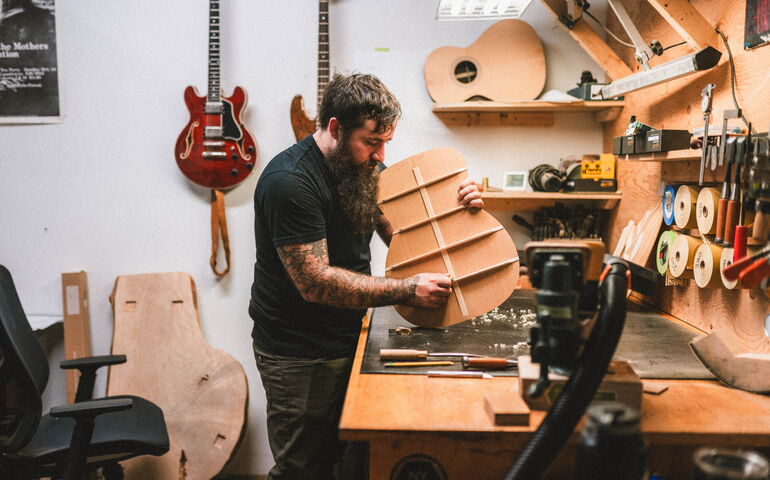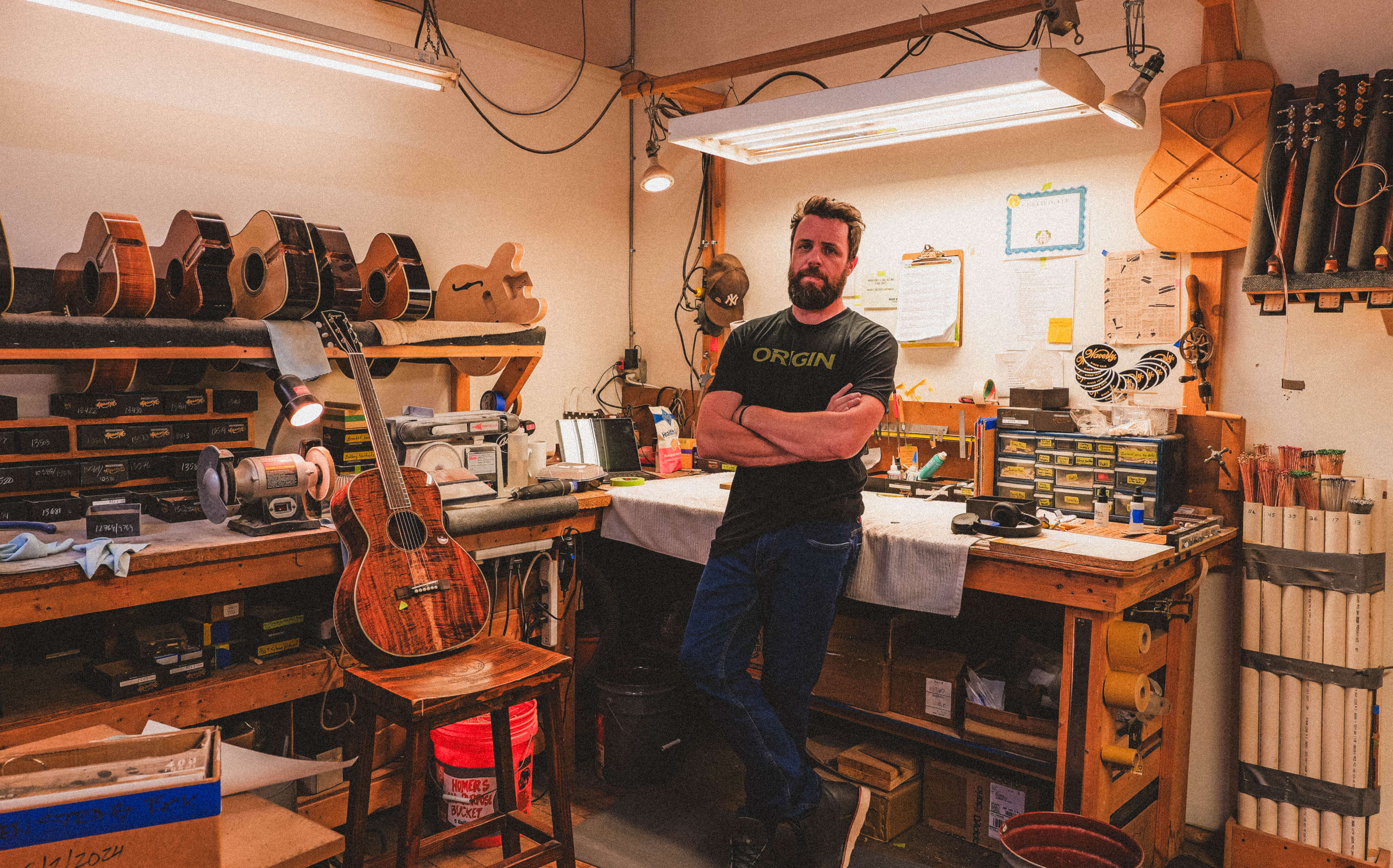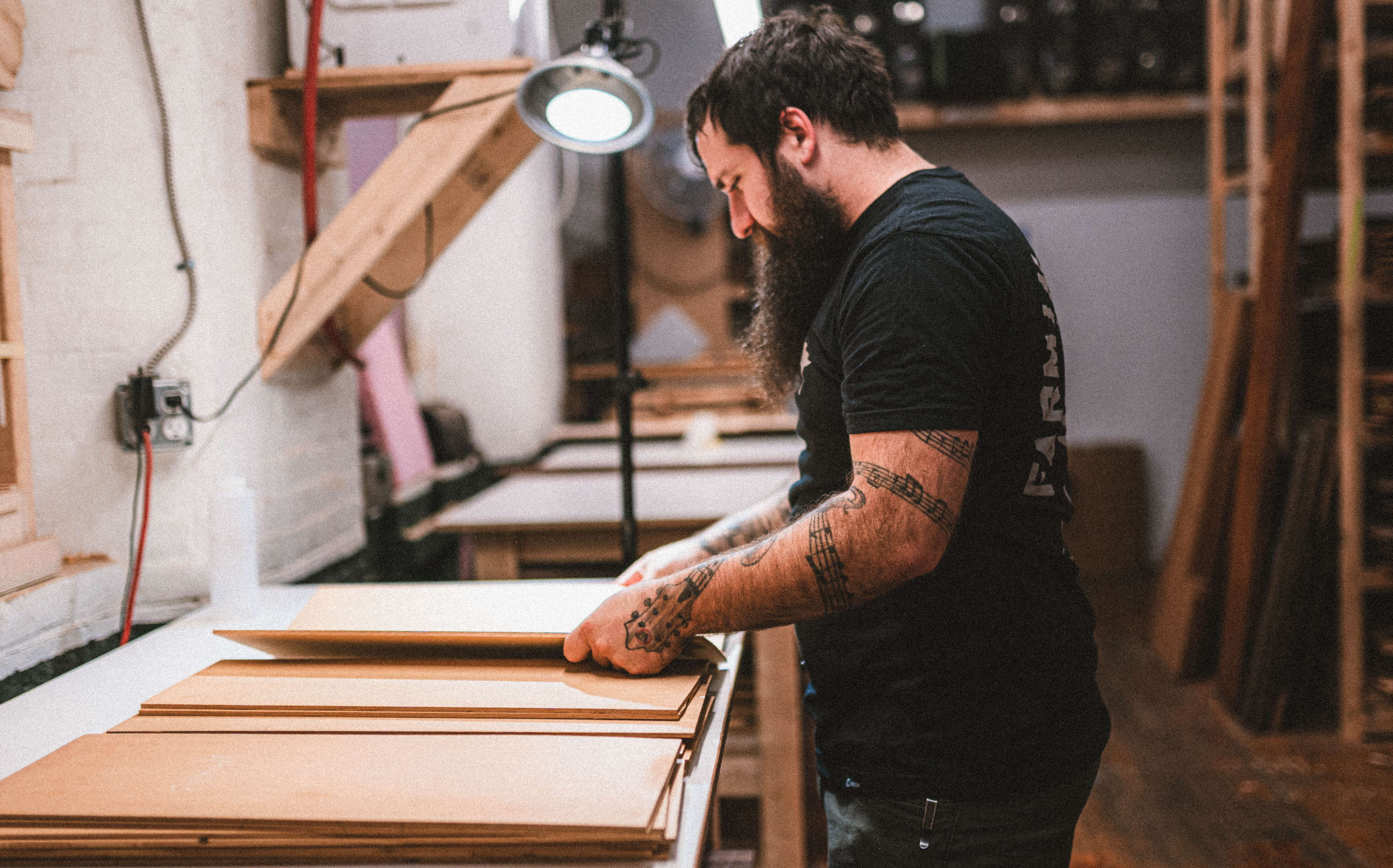
In search of a sustainable source of wood, Lewiston guitar maker buys saw mill
 Photo / Courtesy Bourgeois Guitars
James Witkus, tapped as Dana Bourgeois’s successor as master luthier, has just finished voicing a guitar back and is final sanding the braces.
Photo / Courtesy Bourgeois Guitars
James Witkus, tapped as Dana Bourgeois’s successor as master luthier, has just finished voicing a guitar back and is final sanding the braces.
A Lewiston guitar-making company that’s well-known in the music industry is developing a boutique sawmill to produce finished parts for musical instruments, with a primary focus on red spruce.
Bourgeois Guitars bought 43 and 51 North Lisbon Road in Lewiston from GRE LLC for $1.2 million.
Sam LeGeyt and Jim Harnden from the Dunham Group represented the buyer and Chris Paszyc, Nick Lucas and Chris Romano from the Boulos Co. along with Clayton Larochelle of Fontaine Family represented the seller.
The property consists of a 7,300-square-foot industrial building on three acres.
“In addition to working with red spruce, we want to help cultivate market appetite for some of the incredibly beautiful, resonant and much more sustainable domestic tonewood species found in Maine’s northern forests,” said Christopher Fleming, the CEO of Bourgeois Guitars. “It’s imperative to both the health of our environment and the future of our craft that we work proactively to develop alternatives to the traditional exotics that are so quickly diminishing in supply.”
Bourgeois origins
The business was started by Dana Bourgeois in 1977, when he set up a one-man shop in Brunswick, repairing and building guitars.

In 1992, the company moved to a purpose-built workshop in the Continental Mill in Lewiston. More recently, it’s been at the Roy Hill Mill at 41 Canal St. in Lewiston, where about 20 employees turn out a little over 500 guitars per year. Prices range from $7,000 to, last year, two $100,000 guitars.
In 2019, Bourgeois finalized a partnership with Eastman Music Co., a large instrument manufacturer headquartered in Pomona, Calif., with the goal of drawing on Eastman’s global manufacturing, sourcing, and distribution capabilities.
The partnership also allowed Bourgeois to develop a new market for lower-cost instruments, with a production run of about 1,200 guitars per year sold through a separate dealer and distributor base.
Fleming took over as CEO earlier this year, freeing up Bourgeois to focus on guitar design, product development and mentorship.
Innovations
Dana Bourgeois introduced a number of innovations, according to the company's website, designed to enhance the instrument’s tonal qualities, including the use of "torrified" woods, a detachable neck, and development of new systems of bracing and voicing of the guitars.

Torrefaction is means the wood has been treated with heat, allowing it to resist shrinkage and warping; it improves the wood’s stiffness-to-weight ratio and enhances the sound, Bourgeois has explained on his blog.
Another innovation was the reintroduction of Adirondack spruce, also called red spruce, as a guitar-top tonewood. That eventually led to the company’s current project to develop its own mill.
“Tonewoods” are species that lend a tonal quality to an instrument.
“Mahogany has a woody, rich, sweet tone and rosewood has a more bell-like tone,” Bourgeois has told Mainebiz.
Local wood
A majority of Bourgeois guitars are made with red spruce soundboards. For decades, the company purchased those guitar tops from suppliers in remote parts of the country, often thousands of miles from the nearest red spruce tree.
“Looking out of our workshop windows at stands of mature red spruce trees made us wonder, ‘What would a local model look like?’” said Fleming.
But with a production run in the hundreds and a break-even business model, Bourgeois didn’t have the resources to develop its own mill and logistical infrastructure
“We’ve been a low-margin organization working for love of the craft since day one,” said Fleming. “Though we had certainly thought about it, we simply didn’t have the bandwidth nor the economies of scale required to take on a project of this size.
“But when we partnered with Eastman, I started thinking there was a real opportunity for vertical integration and, with it, far greater control over our supply chain.”
Eastman’s guitar production runs in the tens of thousands, said Fleming.
“The economics started to make sense,” he said.
Forest network
In recent years, Fleming said, he’s focused on developing a network of landowners and forest professionals. The company’s log buyer has been working with local loggers, foresters and landowners in the northern forest to examine woodlots, identify trees suited to tonewood, explain the wood properties that are most highly valued, and procure logs.

In 2022, Fleming started working with Maine Manufacturing Extension Partnership in Augusta to develop a manufacturing plan for a new campus that could accommodate Bourgeois' projected growth and allow for the incorporation of a tonewood mill. The search for real estate found the property at 51 North Lisbon Road, which had a small sawmill, and the adjacent 43 North Lisbon Road, which is vacant land where Fleming said he envisions eventually building a new guitar factory.
Bourgeois Guitars received a four-year $500,000 forgivable loan through Thrive Maine to support equipment acquisition for the mill startup.
Administered by the Finance Authority of Maine, Thrive Maine is a forgivable loan program for businesses and nonprofits that demonstrate COVID-related negative economic impacts.
Overall investment to get the mill up and running is expected to be about $2.5 million. The additional financing came from Eagle Bank in Massachusetts.

Bourgeois is working with Livermore Falls engineering firm Newfangled Solutions to develop custom equipment designed to break down logs into smaller parts that can be turned into finished guitar parts.
The idea is that Bourgeois sources the wood in Maine and the company’s professional sawyers break the log down, examining the wood at every stage for optimal qualities. The wood is then used to produce instruments for Bourgeois and for its parent company, Eastman Music.
“The benefits of sourcing and processing wood locally begin with greater control over the quality of our tonewood, from tree selection to final sanding and grading,” said Fleming. “Additionally, because our local model reduces the overhead and transportation costs carried by outfits operating outside the red spruce growing regions, we can afford to pay a premium directly to local loggers and landowners.”
Built for music
Red spruce displays the highest stiffness-to-weight ratio of any softwood, said Fleming, and has been known as the premier soundboard for acoustic guitars since the 1930s.
“It’s a very special tree which is uniquely built for music,” he said. “Being at once light and strong, it simply outshines the rest in terms of volume and clarity.”
The species grows in a finite region in eastern North America. But most older-growth stands have been pretty well exhausted. he said.
“For many years, you couldn’t find red spruce or, if you could, the trees were too small for musical instrument makers,” he said. “So people started using other spruces like Sitka, Engelmann and so on. That went on for several decades. Unbeknownst to many, we were busy in Maine using red spruce for pulp and two-by-fours.”
Today, he continued, red spruce happens to be one of the most abundant species in Maine’s northern forest region.
“We’ve got this precious renewable resource and an industry that understands it,” he said. “As a local tonewood manufacturer, we can offer our upstream partners a model that will provide the same amount of revenue at a fraction of the cost, all while preserving the resource. There’s nothing but upside here, from both an ecological and economic standpoint. This project is a really positive step for the forest products industry in Maine, from top to bottom.”
Mainebiz web partners
This is so Maine and so cool! This is what Mainebiz is all about









1 Comments